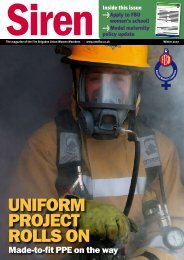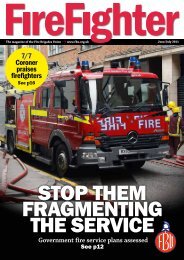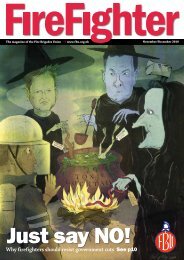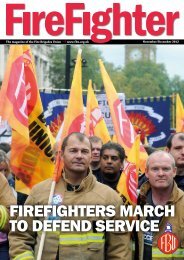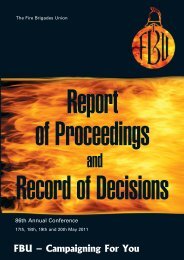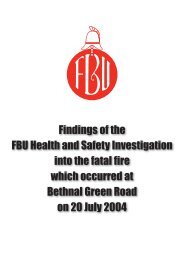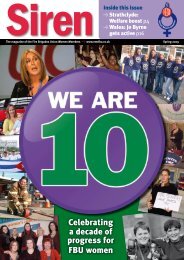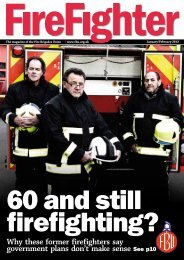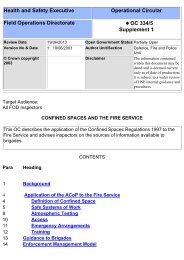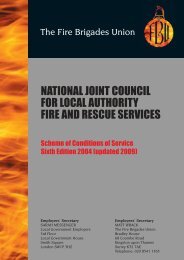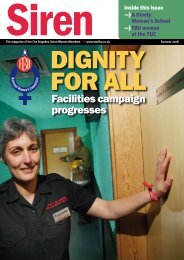Report - Fire Brigades Union
Report - Fire Brigades Union
Report - Fire Brigades Union
Create successful ePaper yourself
Turn your PDF publications into a flip-book with our unique Google optimized e-Paper software.
SECTION G — INTERNAL ADMINISTRATION<br />
A decision was made to pay specific attention to Region 12<br />
and in particular Hampshire where several meetings were<br />
attended for the purposes of recruitment and organising. Visits<br />
were made to stations in the New Forest which is traditionally<br />
an area of Hampshire which has very low FBU membership<br />
and historically firefighters working in this area have held<br />
negative attitudes towards the union. A particular effort was<br />
made to encourage firefighters from this area to join the FBU<br />
and they were encouraged to become active on their<br />
branches. Further to this, significant efforts have been made<br />
locally to support the new members, when talking to other<br />
retained duty system (RDS) firefighters in the New Forest area,<br />
to ensure that they also encourage them to join the FBU.<br />
Hampshire brigade committee and brigade retained duty<br />
system (RDS) meetings were both attended throughout the<br />
year and further opportunities were given to encourage<br />
officials and members to play an active role in the recruitment<br />
campaign. It was especially pleasing to see that the brigade<br />
RDS meetings were very well attended and should be<br />
encouraged as an important resource for officials from<br />
Hampshire FBU.<br />
In addition to the recruitment work within the region,<br />
significant resources were utilised for the purposes of creating<br />
an organising strategy within Buckinghamshire. This was the<br />
first attempt at designing an organising strategy within the<br />
region and it was crucial to this work that the brigade<br />
committee maintained full control of its content and aims<br />
throughout the process and that they were constantly<br />
involved in all the decision making from the draft period right<br />
up until the final copy being produced. Future work designed<br />
to assist officials in Buckinghamshire in implementing the<br />
aims that were set out within the document has been<br />
planned.<br />
Following on from this, Oxfordshire also started work on a<br />
draft strategy. The content has been agreed in principle and is<br />
expected to be completed in the very near future. As in the<br />
case of Buckinghamshire, it is vital that brigade committee<br />
members are the main contributors. A draft version of this<br />
document was nearing completion at the end of 2010.<br />
In Region 4, organising and recruitment work has continued<br />
and April 2010 saw the establishment of a designated<br />
organising committee, attended by the executive council<br />
member, regional chair, FBU national organiser and brigade<br />
membership secretaries, aiming to assist with all membership<br />
and organising issues within the region. Brigade membership<br />
secretaries were encouraged to map their membership and<br />
were encouraged to obtain as much information as possible<br />
about dual-contract members within their brigades in order to<br />
record true membership information. Subsequent coordinated<br />
recruitment campaigns were planned in all brigades, the first<br />
of which took place in November. This recruitment month<br />
required all brigades within the region to commit as much of<br />
their resources as possible into recruitment and organising<br />
meetings. In addition to the designated organising month,<br />
continued efforts have been made by all the brigades in the<br />
region to increase FBU membership and activism within their<br />
respective brigades.<br />
In South Yorkshire local officials built on the existing<br />
organising campaign which was successful during the<br />
industrial dispute in late 2009 and early 2010 and several RDS<br />
branches were visited due to these current efforts. Members<br />
were keen to get an update on the part-time workers<br />
settlement, and this led to a number of new members joining<br />
the FBU.<br />
As reported by local officials at annual conference 2010,<br />
principal management in West Yorkshire attempted to<br />
introduce a co-responding scheme at four stations. Local<br />
officials arranged branch meetings in an attempt to counter<br />
this and were very successful as all branches refused to take<br />
part in this initiative and this initiative also led to a number of<br />
new members. It was clear to everyone involved that it was<br />
vitally important to visit the branches targeted for this scheme<br />
early to give the FBU’s position on co-responding in order to<br />
mitigate the principal management propaganda that was<br />
distributed and to increase the success of avoiding such<br />
schemes being implemented.<br />
Recruitment meetings also took place in both Humberside<br />
and North Yorkshire as both brigades had issues specific to<br />
both retained duty system and wholetime conditions to<br />
discuss with members. It was encouraging that these<br />
meetings have also resulted in new members joining the FBU<br />
from all duty systems.<br />
A series of meetings took place in Region 1 and resulted in<br />
successful recruitment in Fife and Grampian. It was especially<br />
encouraging to note that in Grampian a large number of these<br />
new members chose to join the FBU and resign from the<br />
RFU.<br />
Surrey and Staffordshire held meetings to discuss and<br />
develop organising strategies and provided excellent<br />
opportunities to discuss benefits of mapping, issue-based<br />
recruitment and lessons that were learnt from the South<br />
Yorkshire dispute. Brigade committee members in Surrey<br />
were keen to see examples of organising strategies from<br />
other brigades and were looking at a future strategy<br />
document for their own brigade. In Staffordshire a different<br />
approach to assisting the brigade committee was requested,<br />
including the development of a basic brigade mapping<br />
exercise on which local officials could expand.<br />
Early in 2010 Region 4 executive council member Ian Murray<br />
attended the London Organising School and highlighted the<br />
essential work carried out during the South Yorkshire dispute.<br />
Subsequent organising input was given by the FBU national<br />
organiser at the July London regional committee. The<br />
experience from South Yorkshire demonstrated the need for<br />
accurate brigade mapping and picket line planning. The merits<br />
of regular branch meetings, engaging with members and the<br />
additional campaigns within the major dispute such as the<br />
United against Bullying Week were discussed.<br />
Invitations to speak at regional committees in Wales and the<br />
South East were also received. Officials from these regions<br />
were keen to hear about the organising work that had taken<br />
place throughout other brigades in the UK and what work<br />
120 FBU Annual <strong>Report</strong> 2011





